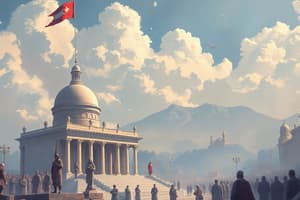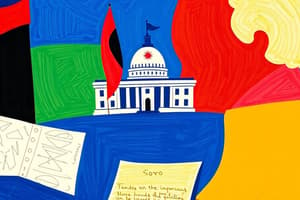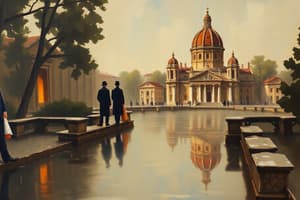Podcast
Questions and Answers
Which political institution is responsible for representing the country on the international stage and for appointing the prime minister or president?
Which political institution is responsible for representing the country on the international stage and for appointing the prime minister or president?
- The Head of State (correct)
- The Cabinet
- The Judicial Branch
- The Legislative Branch
In which system is the executive branch led by the prime minister?
In which system is the executive branch led by the prime minister?
- Presidential system
- Parliamentary system (correct)
- Unitary system
- Monarchial system
What is the primary responsibility of the executive branch?
What is the primary responsibility of the executive branch?
- Interpreting laws
- Overseeing specific areas of government policy
- Enforcing laws and policies (correct)
- Making laws
Which group of ministers is responsible for overseeing specific areas of government policy?
Which group of ministers is responsible for overseeing specific areas of government policy?
What does the term 'polity' refer to?
What does the term 'polity' refer to?
Which branch of government is responsible for ensuring that laws are applied fairly and consistently?
Which branch of government is responsible for ensuring that laws are applied fairly and consistently?
Which institution is responsible for overseeing elections and ensuring that they are free and fair?
Which institution is responsible for overseeing elections and ensuring that they are free and fair?
In a parliamentary system, which house of parliament is responsible for initiating bills and debating them?
In a parliamentary system, which house of parliament is responsible for initiating bills and debating them?
What is the main responsibility of the civil service?
What is the main responsibility of the civil service?
Which branch of government is responsible for making the laws and policies that govern the country?
Which branch of government is responsible for making the laws and policies that govern the country?
Flashcards are hidden until you start studying
Study Notes
Polity: The Political Institutions
Polity is the collective term for the political institutions of a state. These institutions are responsible for making decisions for the state, ensuring the stability and order of society, and providing public goods and services. In this article, we will explore the various political institutions that make up a polity.
The Executive Branch
The executive branch is responsible for enforcing the laws and policies set by the legislative and judicial branches. In a parliamentary system, the executive branch is led by the prime minister, while in a presidential system, the executive branch is led by the president. The executive branch is made up of the following institutions:
-
The Head of State
In a parliamentary system, the head of state is the monarch or president, while in a presidential system, the head of state is the president. The head of state is responsible for representing the country on the international stage and for appointing the prime minister or president.
-
The Cabinet
The cabinet is a group of ministers who are responsible for overseeing specific areas of government policy. The cabinet is led by the prime minister or president and is responsible for making decisions on policy matters.
-
The Civil Service
The civil service is responsible for implementing the policies and laws set by the government. The civil service is made up of professional bureaucrats who are answerable to the cabinet and are responsible for ensuring that government policies are carried out effectively.
The Legislative Branch
The legislative branch is responsible for making the laws and policies that govern the country. In a parliamentary system, the legislative branch is made up of the two houses of parliament, while in a presidential system, the legislative branch is made up of the Congress or Parliament. The legislative branch is made up of the following institutions:
-
The Lower House
The lower house is the more powerful of the two houses of parliament and is responsible for initiating bills and debating them. In a parliamentary system, the lower house is called the House of Commons, while in a presidential system, it is called the House of Representatives.
-
The Upper House
The upper house is responsible for reviewing bills passed by the lower house and for representing the interests of the provinces or regions. In a parliamentary system, the upper house is called the House of Lords, while in a presidential system, it is called the Senate.
The Judicial Branch
The judicial branch is responsible for interpreting the laws and ensuring that they are applied fairly and consistently. The judicial branch is made up of the following institutions:
-
The Supreme Court
The supreme court is the highest court in the country and is responsible for interpreting the constitution and ensuring that laws are in line with the constitution.
-
The Lower Courts
The lower courts are responsible for hearing cases and applying the laws set by the legislative branch.
The Electoral System
The electoral system is responsible for ensuring that the government is accountable to the people. In a parliamentary system, the electoral system is based on proportional representation, while in a presidential system, it is based on a first-past-the-post system. The electoral system is made up of the following institutions:
-
The Electoral Commission
The electoral commission is responsible for overseeing elections and ensuring that they are free and fair.
-
The Political Parties
Political parties are responsible for representing the interests of different groups within society and for participating in the electoral process.
The Civil Society
The civil society is made up of non-governmental organizations, community groups, and other organizations that are not directly affiliated with the government. The civil society plays a vital role in holding the government accountable and in promoting social and economic development.
In conclusion, the political institutions of a polity play a crucial role in ensuring the stability and order of society. These institutions include the executive branch, the legislative branch, the judicial branch, the electoral system, and the civil society. Each of these institutions plays a unique role in making decisions for the state, ensuring the stability and order of society, and providing public goods and services.
Studying That Suits You
Use AI to generate personalized quizzes and flashcards to suit your learning preferences.




